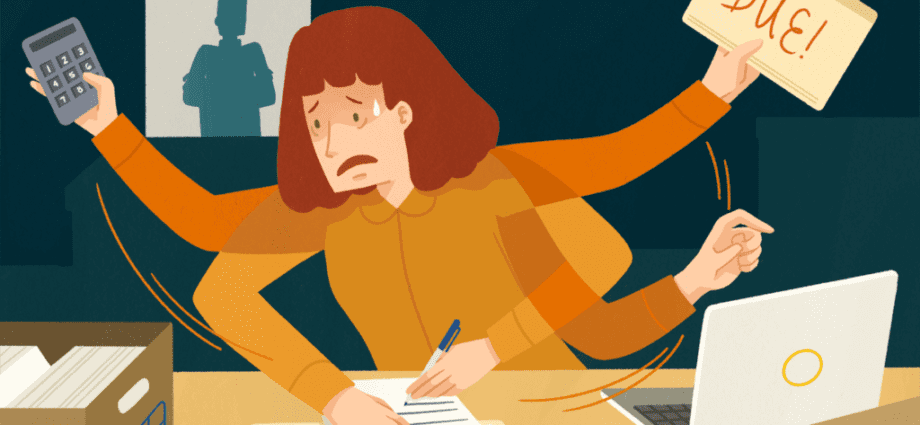Contents
Phobia administrative
Administrative phobia translates into a fear of administrative tasks. We talk about it for the first time in 2014 with the “Thomas Thévenoud affair”. Then accused of tax fraud, the Secretary of State for Foreign Trade, Thomas Thévenoud, invokes administrative phobia to justify his unpaid rents and the non-declaration of his 2012 income. Is administrative phobia a real phobia? How does it manifest itself on a daily basis? What are the causes ? How to overcome it? We take stock with Frédéric Arminot, behaviorist.
Signs of administrative phobia
Any phobia is based on the irrational fear of a particular object or situation and its avoidance. In the case of administrative phobia, the object of the fear are administrative procedures and obligations. “People who suffer from it do not open their administrative mails, do not pay their bills on time or do not return their administrative documents on time”, lists Frédéric Arminot. As a result, unopened papers and envelopes pile up at home, on the desk at work, or even in the car.
More often than not, paperwork phobics postpone their administrative obligations but end up submitting to them on time (or a little late). “They set up object avoidance processes like procrastination”, notes the behaviorist. In extreme cases, invoices remain unpaid and deadlines for file returns are not met. The reminders are linked and the compensation for late payment can climb very quickly.
Is the fear of administrative papers a real phobia?
If this phobia is not recognized today as such and does not appear in any international psychological classification, the testimonies of people who say they suffer from it show that it does exist. Some specialists consider that this is not a phobia but simply a symptom of procrastination. For Frédéric Arminot, it is a phobia, in the same way as the phobia of spiders or the phobia of the crowd. “Administrative phobia is not taken seriously in France while more and more people suffer from it and administrative pressure is growing in our country. It should not be underestimated and made fun of because it arouses shame and silence in those who suffer from it ”, regrets the specialist.
The causes of administrative phobia
Often the object of the phobia is only the visible part of the problem. But it stems from multiple psychological disorders. Thus, to be afraid of administrative procedures and obligations is to be afraid of not succeeding, of not doing it correctly, or even of assuming one’s responsibilities. “This phobia most often affects people who are insecure about themselves. They lack self-confidence, esteem and consideration and fear the consequences and the eyes of others if they don’t do things right ”, explains the behaviorist.
The occurrence of administrative phobia can also be linked to a past trauma such as a tax audit, penalties following unpaid invoices, a poorly completed tax return with significant financial consequences, etc.
Finally, in some cases, administrative phobia can reflect a form of rebellion such as:
- Refusal to submit to the obligations of the State;
- Refusing to do something that you find boring;
- Refusal to do something that you think is irrelevant.
“I also think that the administrative requirements of the State, always more numerous, are at the origin of the increase in cases of administrative phobia”, believes the specialist.
Administrative phobia: what solutions?
If administrative phobia becomes disabling on a daily basis and a source of financial problems, it is better to consult. Sometimes the blockage caused by strong emotions (anxiety, fear, loss of self-confidence) is so strong that you cannot get out of it without psychological help to understand the problem. Understanding the origin of the disorder is already an important step towards “healing”. “I ask people with an administrative phobia who come to see me to contextualize the situation by explaining to me why administrative papers are a problem for them and what they have already tried to put in place to overcome their phobia. My goal is not to ask them to redo what didn’t work before ”, details Frédéric Arminot. The specialist then determines an intervention strategy based on exercises aimed at reducing the anxiety and anxiety of paperwork so that people are no longer afraid of administrative obligations and submit to them on their own, without that they are forced to do so. “I help them to have responsible administrative behavior by reducing their fear”.
If your administrative phobia is more like procrastination but you still end up bending over your administrative papers at one point or another, here are some tips to avoid feeling pressed for time and obligations:
- Don’t let letters and invoices pile up. Open them as you receive them and note on a calendar the different deadlines to be respected to have an overview.
- Choose to do this at times when you feel most motivated and focused. And take a seat in a quiet place;
- Don’t do it all at once, but rather step by step. Otherwise, you will feel like the amount of paperwork to be completed is impractical. This is the Pomodoro technique (or the “tomato slice” technique). We devote a predefined time to the accomplishment of a task. Then we take a break. And we resume on another task for a while. And so on.
Need help to undertake your administrative procedures? Note that there are public service houses in France. These structures offer free administrative support in many areas (employment, family, taxes, health, housing, etc.). For those who can afford to pay for administrative support, private companies, such as FamilyZen, offer this kind of service.










